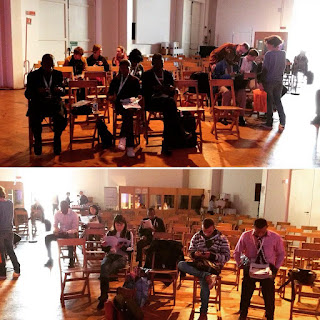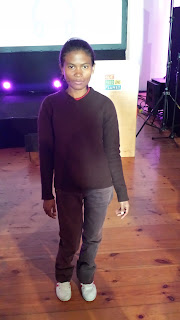By Andrea Listanti
 |
| Young participants Photo credit: Francesca Borgia |
On the first two days at Terra Madre Youth we made connections, we got inspired, shared knowledge and learnt from each other. The underlying theme of the third day was to put to practice our ideas. IFAD had co-organized an event focusing on young entrepreneurship and agriculture in the Superstudio Più. purple room.
The purpose of the event was to discuss the global challenge of feeding the world, in an era when we are faced with an increasing decline of young people's willingness to stay or start working in agriculture. We were challenged to present innovative ideas to encourage youth to return to the land and to transform rural areas.
The speakers were young entrepreneurs, who have benefitted from IFAD-PROCASUR projects in Africa, Latin America and Asia. They presented their experience on how they had engaged in agriculture and encouraged others to follow their lead. The interactive session provided the opportunity for the audience to ask questions, share their ideas and put proposals on the table.
 |
| Pape Samb Photo credit: Andrea Listanti |
Pape Samb, the chairperson of Global Youth Innovation Network (GYIN), one of IFAD's partners, told the audience that GYIN brings together governments, private sector and non-profit organizations to create an environment to support youth in development.
“Young people who decide to devote their lives to agriculture must be put in the condition of becoming entrepreneurs. They need knowledge and capital to start their businesses”, Samb said.
A participant from Zimbabwe asked Samb this thought-provoking question: "Considering that accessing the GYIN’s online platform is essential for building capacity and in many rural areas few of us have access to the internet, how can we ensure that everybody is able to get this opportunity?"
In answering, Samb stressed the importance of the horizontal support. “While we wait for effective infrastructure to be built in rural areas, those who have access to the internet can act as facilitators for those who do not. Moreover, the people in the city can set up a mentoring programme for their brothers and sisters living rural areas and in doing so, they can also build their capacity.”
The moving and profound stories of rural young people who had managed to create a business for themselves and their communities underscored the importance of support and the role of donors such as IFAD in transforming rural areas and making them attractive.
 |
| The young speakers Photo credit: Andrea Listanti |
Dhruba, from Nepal, spoke about the role of PROCASUR in the horizontal knowledge-sharing between farmers. “To build our capacity we don’t need to hire experts, because PROCASUR facilitates the horizontal exchange of know-how. It creates a knowledge base to be shared with the community, which meets our needs. Then it gathers different people from different villages to share the information. This innovative approach has led to good results. For example, in Cambodia farmers used to sow the seeds directly to the land. These farmers benefitted from a learning route and learnt from other fellow farmers in the region how to improve the sowing process by using more sophisticated tools”.
Then it was the turn of Ambroise, from Benin. “I decided to work in the agriculture sector when I read the 2010 IFAD annual report, which said that Africa had doubled its agricultural production. I want to feed my country and Africa and I know to do so I have to address many challenges. For example, we need to learn when to sow seeds so that we have a good harvest. We need to know where to buy our seeds, how and when to use fertilizers, where and how to get access to credit."
"Receiving seeds when it's too late does not make us good farmers. At the same time not having the appropriate equipment, also does not make us good farmers", says Ambroise. "We got a tractor for a three-year test period, and during this time we managed to partner with the organization who provided us with it, this way the grant was renewed for another six years”, Ambroise said, and he proudly showed us a picture of his wonderful tractor.
 |
| Darlene Photo credit: Andrea Listanti |
The moderator, Darlene a young lady from Cameroon, was also inspiring and engaging. Her way of encouraging the audience to interact was very powerful. She too shared her story. “I was studying engineering, when I decided to become a farmer. My parents thought I was crazy, and didn’t want me to pursue my vocation. So I graduated and started working. When I had saved enough money I resigned and I started my own rural enterprise. Some years after, when my parents saw the pictures of my farm, they told me ‘ask us anything you want!’".
"I was invited to speak on national TV, where I showed pictures of my field. Immediately afterwards many people contacted me and told to me ‘wow, this works! I didn’t believe agriculture could be so cool!’. If we want the youth to work in agriculture, we have to bring agriculture to the them and raise awareness about the marvels of this sector", says Darlene.
 |
| Speakers and participants Photo credit: Andrea Listanti |
The fourth testimonial was Blanca, from Peru. She spoke about access to credit for rural youth. “I started working with 14 other young companions, but initially we didn’t have enough resources to invest in our project. Fortunately my mother gave us the land where we built our farm, using the tools provided by PROCASUR. IFAD helped us obtaining access to credit. Thanks to IFAD and PROCASUR we are helping rural youth realizing their dreams”.
After the workshop, Blanca told us she was so happy to have attended Terra Madre Youth event, and she was looking forward to participating in other Slow Food-organised events.
 |
| Zoeliarimalala Photo credit: Andrea Listanti |
Last but not the least, we heard Zoeliarimalala's story who comes from Madagascar. “My island is famous for its livestock. I milk my cows, and my dream has always been to produce and sell yogurt. When I started I didn’t have access to electricity nor to the internet. I began my activity by going door to door and selling them my yogurt. After two months I started selling my products in other cities and villages. But artisanal yogurts are sold everywhere in Madagascar, so there is a lot of competition among producers. I knew that if I wanted to succeed, my product needed to be different", says a proud Zoeliarimalala.
"I was lucky to meet a young producer of Moringa - a tropical plant. We decided to cooperate and create an innovative product that maintained the characteristics of yogurt and added the high nutritional value of Moringa. Now we are feeding two elementary schools and two middle schools. Our yogurt and Moringa is healthy and cheap and has contributed to increase food security and nutrition for the boys and girls of these schools".
Zoeliarimalala’s story was truly emotional. It was incredible to see how a tiny girl could be so strong and determined. Listening to her, as well as to others, was a unique experience. We really got to understand what are the best practices to develop innovative ideas around food production.
Utterly inspired, on our final day, we'll be taking all of this to the Expo.
















